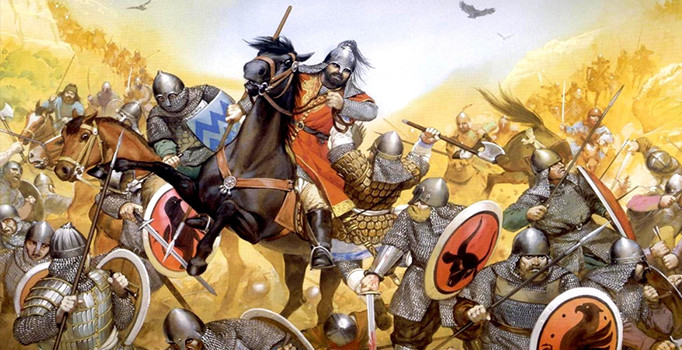The Battle of Malazgirt, also known as the Battle of Manzikert, was a pivotal moment in the history of the Byzantine Empire and the Seljuk Turks. The battle took place on August 26, 1071, near the town of Manzikert (modern-day Malazgirt) in eastern Turkey. It was a decisive victory for the Seljuks, and it marked the beginning of the Turkish domination of Anatolia.
The Byzantine Empire had been in decline for some time before the Battle of Malazgirt. The empire had lost much of its territory in the Middle East to the Muslims and was facing financial difficulties. The Seljuks, on the other hand, were a rising power in the region. They were a Turkic people who had migrated from Central Asia and had established a powerful state in Iran and Iraq. They had also been expanding into Anatolia, which was still part of the Byzantine Empire.
The Byzantine Emperor at the time, Romanos IV Diogenes, decided to lead an army to Anatolia to try to stop the Seljuks. He gathered a large force of around 40,000 soldiers, including Byzantine regulars and mercenaries from Europe. The Seljuks, led by Sultan Alp Arslan, had a smaller force of around 30,000 soldiers, but they were experienced warriors who were well-trained in horse archery.
The two armies met on the plains of Malazgirt, and the battle began. The Byzantine army initially had the upper hand, as their heavy cavalry charged into the Seljuk lines. However, the Seljuks quickly adapted to the Byzantine tactics and began using their superior mobility to outflank the Byzantine forces. They also used their horse archers to harass the Byzantine troops and disrupt their formations.
The battle continued for several hours, with both sides suffering heavy losses. At one point, it seemed like the Byzantines might be able to turn the tide of the battle. However, the Seljuks launched a surprise attack on the Byzantine camp, which caused chaos and confusion among the Byzantine soldiers. The Seljuks were able to capture the Byzantine emperor, Romanos IV Diogenes, and many of his top commanders.
The capture of the emperor was a major blow to the Byzantine army, and it caused their morale to collapse. The remaining Byzantine soldiers fled the battlefield, leaving behind their wounded and dead. The Seljuks had won a decisive victory, and they were now free to expand their control over Anatolia.
The Battle of Malazgirt was a turning point in the history of the region. It marked the beginning of the Turkish domination of Anatolia, which would last for centuries. The Byzantine Empire, which had been one of the most powerful states in the world, continued to decline after the battle. It would eventually be conquered by the Ottoman Turks in 1453.
The Battle of Malazgirt also had significant cultural and social consequences. The Seljuks were a Muslim people, and their victory over the Byzantines opened the way for the spread of Islam in Anatolia. Over the centuries, the Turkish people would become the dominant culture in the region, and their language and customs would become the norm.
In conclusion, the Battle of Malazgirt was a pivotal moment in the history of the Byzantine Empire and the Seljuk Turks. It marked the beginning of the Turkish domination of Anatolia and the decline of the Byzantine Empire. It also had significant cultural and social consequences, as it opened the way for the spread of Islam in the region. Today, the battle is remembered as one of the most important events in the history of Turkey and







 The Battle of Malazgirt, also known as the Battle of Manzikert, was a pivotal moment in the history of the Byzantine Empire and the Seljuk Turks. The battle took place on August 26, 1071, near the town of Manzikert (modern-day Malazgirt) in eastern Turkey. It was a decisive victory for the Seljuks, and it marked the beginning of the Turkish domination of Anatolia.
The Battle of Malazgirt, also known as the Battle of Manzikert, was a pivotal moment in the history of the Byzantine Empire and the Seljuk Turks. The battle took place on August 26, 1071, near the town of Manzikert (modern-day Malazgirt) in eastern Turkey. It was a decisive victory for the Seljuks, and it marked the beginning of the Turkish domination of Anatolia.











Add Comment